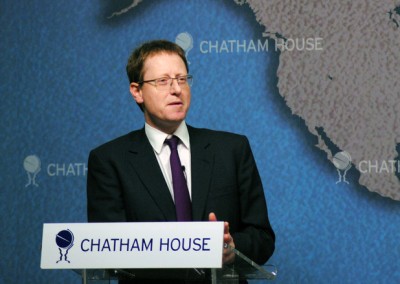How The Guardian Told Me to Steer Clear of Palestine

Jonathan Freedland, The Guardian’s opinion editor, is an apologist for ethnic cleansing. (Chatham House/Flickr)
When I started out as a journalist in the 1980s, I asked an experienced Irish reporter for advice. “Read The Guardian,” he told me.
The message that there was no better newspaper had a lasting effect. For years, I wanted to write for The Guardian. Eventually, this desire was realized after I emailed the late Georgina Henry, then editor of its Comment is Free section, in 2007. Henry was immediately receptive to my idea of tackling the European Union from a critical, left-wing perspective.
I very much enjoyed contributing to The Guardian. Having previously worked for quite a stuffy publication, it felt liberating to be able to express opinions.
There was one issue, however, on which I felt my freedom curtailed: Palestine. AlthoughThe Guardian did publish a few of my articles denouncing Israeli atrocities, I began to encounter obstacles in 2009.
Sensitive
Early that year, I submitted an exposé of how the pro-Israel lobby operates in Brussels. While waiting to find out if the piece would be used, I phoned Matt Seaton, who had taken over as comment editor. We had a pleasant conversation but Seaton stressed that he regarded the subject as sensitive.
I, then, modified the piece to make its tone less polemical. Still, it was not published. (Seaton has subsequently moved to The New York Times.)
A few months later, I paid a visit to Gaza. From there, I contacted The Guardian to say that I had interviewed Sayed Abu Musameh, a founding member of Hamas.
Abu Musameh had expressed an interest in visiting Belfast to study how the Irish peace process worked. He had already held discussions with Gerry Adams, the Sinn Féinleader who had persuaded the Irish Republican Army to call a ceasefire.
Abu Musameh, I felt, was saying something that jarred with the official view of Hamas presented by Israel and its Western supporters. Far from being addicted to violence, he was eager to learn about what policy wonks call “conflict resolution.”
The Guardian was not keen to have me writing from Gaza. Brian Whitaker, a commissioning editor at the time, told me that its comment section received more submissions about Palestine than any other subject. Whitaker, ironically a Middle East specialist, effectively recommended that I stick to writing about the EU. (The recommendation was bizarre both because Palestine is a key issue for the EU and because I am one of the few journalists to examine the Union’s complicity in Israel’s crimes).
Frustration
I have decided to make my frustrating encounters with The Guardian public after reading the diatribe it published last week by Daniel Taub, Israel’s ambassador to the UK. Taub uses a quote attributed to Golda Meir, Israel’s prime minister from 1969 to 1974, to hit back at aid agencies who accuse Israel of impeding Gaza’s reconstruction: “We will only have peace when our enemies love their children more than they hate ours.”
The inference that Palestinians hate Israelis more than they love their children is a racist caricature brilliantly demolished by Rafeef Ziadah in her poem “We teach life, Sir.” Yet, according to Taub, Meir’s words represent a “bitter truism.”
The Comment is Free section of The Guardian, where Taub’s nasty rant appears, is nowoverseen by Jonathan Freedland, a liberal Zionist. I contacted Freedland to enquire if he approved Taub’s article for publication.
Freedland referred my message to the paper’s “media enquiries” unit. A spokesperson, who did not give his or her name, replied by email that Comment is Free “hosts hundreds of discussions every month on a wide range of topics across the entire political and ideological spectrum.”
“We receive a huge amount of submissions for articles and aim to publish a plurality of voices from all over the world,” the spokesperson added. “Naturally, not all of these voices reflect The Guardian’s own editorial position.”
Apologist for ethnic cleansing
I am not in the least reassured by that response. Taub’s article was the second one published by The Guardian in as many months from a senior Israeli political or diplomatic figure. In February, the paper gave Yair Lapid, until recently Israel’s finance minister, a platform to describe calls for a cultural boycott of Israel as “shallow and lacking in coherence.”
Lapid’s view chimes with The Guardian’s “own editorial position,” to quote its anonymous spokesperson. While Israel was bombing Gaza last August, it ran a leaderaccusing London’s Tricycle Theatre of making a “bad error of judgment” in refusing to host a film festival sponsored by Israel.
As Ben White demonstrated in a trenchant 2014 analysis for Middle East Monitor, Jonathan Freedland is an apologist for ethnic cleansing. Freedland has tried to justify how “400 [Palestinian] villages” were “emptied” by Zionist forces in 1948 on the grounds that “the creation of a Jewish state was a moral necessity.”
If Freedland is prepared to defend Zionist war crimes, I guess it is not surprising that he is reserving space for naked Israeli propaganda in The Guardian’s comment section. While it is difficult to imagine that this bastion of liberalism would welcome openly racist submissions from far-right organizations like the British National Party or English Defence League, it is somehow acceptable for an Israeli diplomat to peddle bigotry against Palestinians.
Freedland has been tipped as a contender for The Guardian’s editor-in-chief, a post that is soon to be vacant.
In a perverse way, it might be a good thing if he gets the job. With Freedland at the helm, it would be easier to show how a supposedly progressive newspaper is in thrall to the toxic ideology of Zionism.

